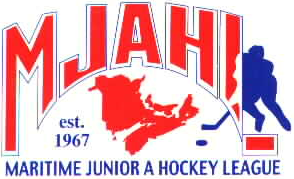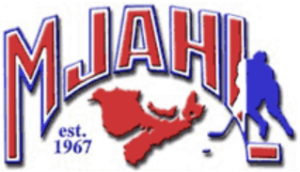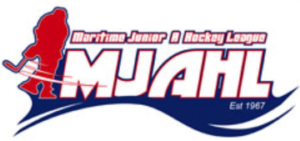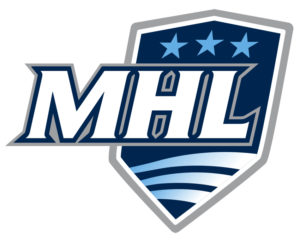Maritime Junior Hockey League: A Brief Look Back
The Maritime Junior Hockey League (MHL) can trace its roots back to 1967 when Fred McGillivray and Louie Lewis, both of Halifax, and Don Stewart of Berwick, N.S. started it on its way. It began as a six team, all-Nova Scotia Junior B league with teams in East Hants, Halifax, Dartmouth, Windsor, Kentville, and Berwick and was originally called the Metro Valley Junior Hockey League (MVJHL). Truro and Amherst joined the league for the 1968-69 season.
The league had as many as ten teams in the early 70’s, with franchises in New Glasgow, Kentville, Pictou, and Stellarton. In 1977, the MJVHL became a Junior A league still operating under the Metro Valley banner. Al Hollingsworth, one of many Nova Scotia hockey builders who have served as president of the league, said this move took the players into the mainstream of Canadian hockey. Four years later, the Scotia Colts, who had joined in 1976, hosted the Centennial Cup National Junior A Championship at the Halifax Metro Centre.
 In 1983, the Moncton Midland Hawks, one of the forerunners of the Gagnon Beavers, became the first out of province team to join the circuit. The Antigonish Bulldogs joined in 1986, the same year that the Scotia Colts once again hosted the Centennial Cup. The Summerside Western Capitals, members of the Island Junior Hockey League, hosted the Centennial Cup in 1989.
In 1983, the Moncton Midland Hawks, one of the forerunners of the Gagnon Beavers, became the first out of province team to join the circuit. The Antigonish Bulldogs joined in 1986, the same year that the Scotia Colts once again hosted the Centennial Cup. The Summerside Western Capitals, members of the Island Junior Hockey League, hosted the Centennial Cup in 1989.
Teams from Charlottetown and Summerside joined the loop in 1991 and it was soon renamed the Maritime Junior A Hockey League (MJAHL). The Amherst Ramblers hosted the Centennial Cup in 1993. Derek Cormier of Moncton was named Canadian Junior A Player of the Year that same season.
In 1996, with teams in Amherst (Ramblers), Antigonish (Bulldogs), Charlottetown (Abbies), East Hants (Penguins), Dartmouth (Oland Exports), Summerside (Western Capitals), Moncton (Gagnon Beavers) and Saint John (Alpines), the MJAHL welcomed the Cape Breton Islanders and a team from Restigouche. The Alpines did not last the season, exiting after playing 33 of 56 games. The Summerside Western Capitals hosted the Royal Bank Cup at Cahill Stadium in 1996-97 and won the league’s first ever national title with a 4-3 victory in the championship game over the South Surrey Eagles.
The Truro Bearcats, who had folded from the MVJHL in early 1983, rejoined with a new franchise in 1997-98. Cape Breton, which had moved to Glace Bay and become the Miners, folded part-way through that season with the arrival of the Quebec Major Junior Hockey League’s Cape Breton Screaming Eagles. During the 1998-99 season, the Dartmouth Oland Exports moved to the Halifax Forum and became Halifax Oland Exports. At the end of the season, the Restigouche River Rats, who had won their second league championship in 1997-98, changed their name to the Campbellton Tigers. A tenth team was added to the MJAHL for the 2000-2001 season: the Miramichi UPM Timberwolves. At the same time the East Hants Penguins moved to Dartmouth and became the Scotia Dairy Queen Blizzard.
 At the end of the 2001-02 season, the MJAHL approved the transfer of the Dartmouth franchise and the Yarmouth Motormart Mariners began play in September of 2002. The league got its second national championship when the Halifax Oland Exports won the 2002 Royal Bank Cup on home ice. In early 2003 the league governors approved expansion into Woodstock, N.B. with the Slammers to begin play in the 2003-04 season. The MJAHL also hired Vernon Doyle as its first full-time president.
At the end of the 2001-02 season, the MJAHL approved the transfer of the Dartmouth franchise and the Yarmouth Motormart Mariners began play in September of 2002. The league got its second national championship when the Halifax Oland Exports won the 2002 Royal Bank Cup on home ice. In early 2003 the league governors approved expansion into Woodstock, N.B. with the Slammers to begin play in the 2003-04 season. The MJAHL also hired Vernon Doyle as its first full-time president.
The Oland Exports changed their name to Halifax Team Pepsi for the 2003-04 season. That spring, the Weeks Hockey Organization bought the club, moved it to New Glasgow and renamed it the Pictou County Weeks Crushers for the 2004-05 season. The Halifax Wolverines would also join the league that season, having been granted an expansion franchise. In 2005, the Campbellton Tigers changed their name to the Restigouche Tigers.
The MJAHL would see big changes in 2008. The Antigonish Bulldogs moved to Halifax and became the Lions, the Halifax Wolverines were transferred to Bridgewater and became the Lumberjacks, and the Moncton Gagnon Beavers moved to nearby Dieppe and were renamed the Commandos. The Charlottetown Abbies were granted a one-year absence from the league, but would not operate again. Following the 2008-09 season, The Tigers would again swap their name from Restigouche back to Campbellton.
 In 2010, the league would change its name to the Maritime Junior Hockey League (MHL) and unveil a new logo. Prior to the 2010-11 season, the Halifax Lions moved to Dartmouth and were renamed the Metro Marauders. The team was renamed the Metro Shipbuilders for the 2012-2013 season, but that would be its last in the city. The franchise was moved to Kentville for 2013-14 and renamed the Valley Wildcats. After one season in Kentville, the team moved to Berwick, retaining the Valley Wildcats name.
In 2010, the league would change its name to the Maritime Junior Hockey League (MHL) and unveil a new logo. Prior to the 2010-11 season, the Halifax Lions moved to Dartmouth and were renamed the Metro Marauders. The team was renamed the Metro Shipbuilders for the 2012-2013 season, but that would be its last in the city. The franchise was moved to Kentville for 2013-14 and renamed the Valley Wildcats. After one season in Kentville, the team moved to Berwick, retaining the Valley Wildcats name.
The league granted an expansion franchise to St. Stephen in 2014 and the County Aces brought the league back to twelve teams for the first time since 2007-08. Prior to 2014-15, the Bridgewater Lumberjacks were renamed the South Shore Lumberjacks.
The Dieppe Commandos moved to Edmundston ahead of the 2017-18 season and renamed the Blizzard. The team would win the league championship in its first season in the northern New Brunswick city. At the end of the season, the Woodstock Slammers moved a short distance up the road to Grand Falls. The relocated team were dubbed the Grand Falls Rapids.
Following the 2018-19 season, the St. Stephen Aces moved to Fredericton and became the Red Wings. The Amherst Ramblers hosted the 2019 Fred Page Cup, which would ultimately be the last time the tournament was held. The 2019-20 season would come to an abrupt end just as the Canadian Tire Cup Playoffs were slated to start due to the COVID-19 pandemic, which cancelled the Junior A playoffs from coast to coast as well as regional championships such as the Fred Page Cup and national Centennial Cup. The tournaments would be canceled again in 2021, after which the CJHL announced all league champions would advance directly to the national championship to compete alongside the host team.
The Canadian Tire Cup would be awarded once again in the 2021-22 season after the COVID-19 pandemic caused back-to-back seasons of no league championship. The league trophy was renamed, starting with the 2022-23 season, to the Metalfab MHL Cup. There was a shake-up prior to the 2023-24 season. The South Shore Lumberjacks moved to Grand-Bouctouche, N.B. and were renamed the West Kent Steamers. As a result, the team joined the Eastlink North Division, and the Summerside Western Capitals moved to the Eastlink South Division.
Accomplishments
MHL teams have captured two National Junior A Championships. Summerside Western Capitals hosted the tournament in 1997 and were crowned champions and Halifax Oland Exports did the same thing in 2002. Apart from hosting, the route to the national championship since 1996 goes through the Fred Page Cup which includes league winners from the CCHL and LHJAAAQ. Seven MHL teams have captured the Eastern Canadian title: Moncton Beavers (1996), Charlottetown Abbies (1999), Halifax Oland Exports (2002), Pictou County Weeks Crushers (2008), Summerside Western Capitals (2009), Woodstock Slammers (2012), and Truro Bearcats (2013).
Three players from the MHL have been recognized as the Canadian Junior Hockey League Player of the Year: Duane Saulnier (Halifax DQ Blizzard, 1989-90), Derek Cormier (Moncton Beavers, 1992-93), and Jordan Knox (Summerside Western Capitals, 2005-06). Summerside Western Capitals Head Coach Billy McGuigan was named the 2019-20 Darcy Haugan/Mark Cross Memorial Award winner as CJHL Coach of the Year. In 2022-23, Ed McNeill of the Summerside Western Capitals was named the CJHL Defenseman of the Year.
The MHL has become recognized for developing players for U Sports teams, including those in Atlantic University Sport (AUS). An increasing number of players are also heading south of the border to NCAA teams. Scholastic achievements by MHL players has not gone unnoticed through a number of scholarships over the years. Nationally, four MHLers have been named CJHL Academic Player of the Year (formerly RBC National Junior A Scholarship): Jeff Ellis (Charlottetown Abbies, 2001-02), Donald Johnstone (Truro Bearcats, 2002-03), Samuel MacCormick (Bridgewater Lumberjacks, 2009-10), and Luke MacMillan (Truro Bearcats, 2018-19)
The Callaghan Cup
The Callaghan Cup, emblematic of junior A hockey supremacy in Atlantic Canada, was awarded annually to the playoff champion in the MJAHL. It became part of the Canadian Hockey awards in the 1980-81 season to the winner of the Atlantic Junior A Hockey Championship. The trophy was presented to the C.A.H.A. by the Prince Edward Island Hockey Association, in honour of J. Pius Callaghan, a Charlottetown native.
Until the MJAHL became the region’s only junior A league in 1991, teams from the Metro Valley Junior A Hockey League and Island Junior A Hockey League, and in earlier years the Newfoundland Junior Hockey League and New Brunswick Junior Hockey League, competed for the Callaghan Cup.
J. Pius Callaghan was first elected to the Maritime Amateur Hockey Association executive in the early 1950’s. He served as its president on two separate occasions and stayed with the group until 1973 when it disbanded to become separate provincial associations. He was the first president of the P.E.I. Hockey Association, Maritime Junior Hockey League, and Prince Edward Island Junior Hockey League. In 1973, Callaghan was presented with the Canadian Hockey Association’s meritorious award for long time service to hockey in Canada. He is a life member of the P.E.I. hockey association and a member of the P.E.I. Sports Hall of Fame.
Although he studied to be a lawyer, Callaghan became a school teacher. He later joined the Guardian-Patriot as a sports writer and moved on to become the paper’s managing editor.
The Kent Cup
Kent Building Supplies became the title sponsor of the MJAHL in the 2005-06 season, and the championship trophy was renamed the Kent Cup. This agreement lasted for eleven seasons until 2016-17 when teams began competing for the Maritime Hockey League Cup.
The Canadian Tire Cup
After two seasons where teams competed for The MHL Cup, Canadian Tire came on board as a title sponsor beginning in 2018-19 and a new trophy was commissioned. Due to the COVID-19 pandemic, the trophy was only awarded twice
The Metalfab MHL Cup
The league trophy was renamed the Metalfab MHL Cup for the 2022-23 season as Canadian fire truck manufacturer Metalfab Ltd came aboard as the title sponsor.













